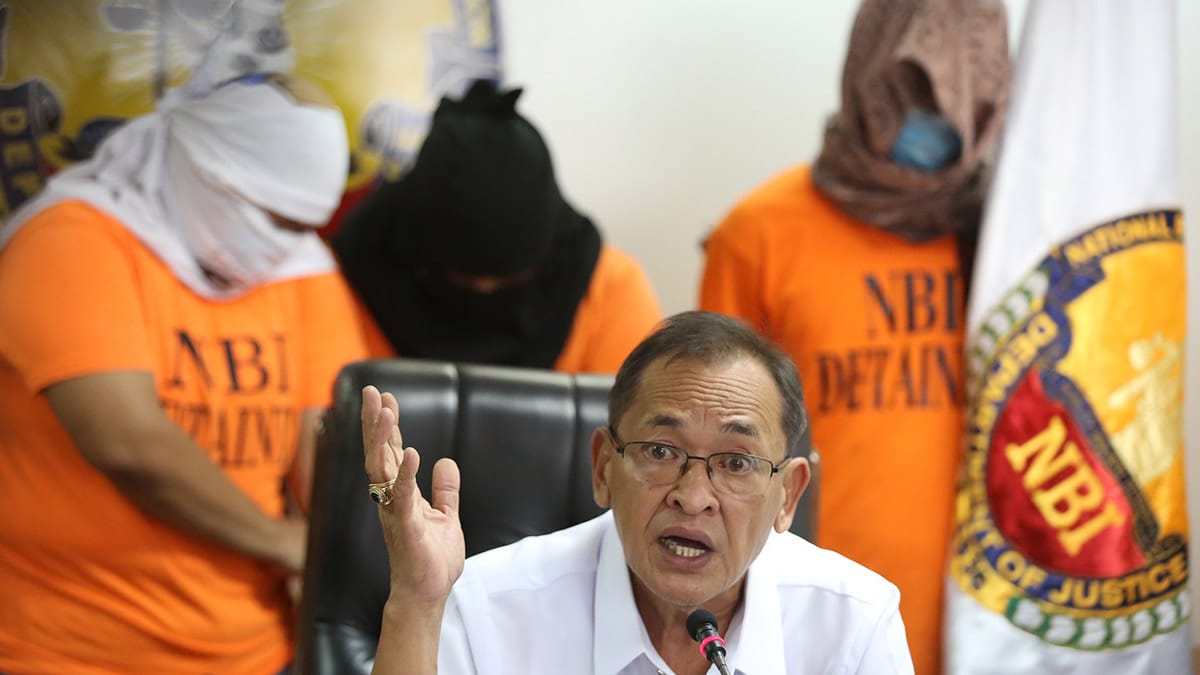
BLACK MARKET FOR ORGANS The National Bureau of Investigation, led by its Director Jaime Santiago, presents the three individuals allegedly involved in the illegal sale of human organs on Tuesday. The suspects say they promised their victims P200,000 in exchange for one of their kidneys. —Niño Jesus Orbeta
MANILA, Philippines — Authorities have uncovered a clandestine trade of human organs in the Philippines preying on vulnerable people who are offered a huge sum in exchange for one of their kidneys.
A head nurse at the National Kidney and Transplant Institute (NKTI) in Quezon City was implicated as the alleged leader of the organ trafficking syndicate, the National Bureau of Investigation said in a statement on Tuesday.
The nurse, identified by the NBI as Allan Ligaya, remains at large. Three of his associates were arrested on allegations that they operated a black market for human organs in Bulacan province, the NBI said.
READ: African tagged in human organ trafficking arrested
Nine of their alleged victims were rescued during an operation on July 11, it added.
Investigation
Reached for comment, the NKTI issued a statement confirming that Ligaya worked for the government specialty hospital.
“While we confirm that the said nurse is indeed an employee of the NKTI, we would like to assure the public that the management is already conducting its own investigation on the matter,” it said.
“We would also like to warn the public of transactions outside of the hospital entered into by certain groups, organizations, or private individuals claiming to be from the NKTI. The NKTI… honors only legitimate transactions regarding living organ donation and transplantation, including deceased organ donation,” the hospital added.
P200,000 payment
The three suspects in NBI custody—Angela Atayde, Marichu Lomibao and Dannel Sicat—were accused of luring victims into accepting P200,000 for one of their kidneys to be removed and transplanted to a paying client, the bureau said.
The NBI, along with Bulacan police and personnel from San Jose Del Monte (SJDM) City’s Social Welfare and Development Office, conducted a raid on a house in SJDM after receiving a tip on the organ trafficking operation.
The nine rescued victims were turned over to the city’s social workers.
As part of the suspects’ modus operandi, the victims were first introduced to the intended recipient of their kidney and “would be given a downpayment,” the NBI said.
They were later moved to a house in Barangay Tungkong Mangga in SJDM, where they were attended to and then checked to see if they were healthy enough for the surgical procedure and as an organ source.
“[The] victims will be held at the said house while undergoing various processes until their kidneys are eventually transferred,” the NBI said.
A separate statement from the Department of Justice (DOJ) said four of the nine rescued victims already had one of their kidneys taken out and sold.
The DOJ said the victims were recruited “under the pretense of alleviating their financial burdens by selling their kidneys.”
“The traffickers orchestrated the illegal transplants, exploiting the victims’ economic vulnerabilities,” it said.
Living, deceased donors
According to the DOJ, the suspects were arrested “while attempting to deliver payments to one of the victims.”
“They were arrested for their involvement in harboring, and maintaining the victims for organ trafficking purposes,” it added.
“This operation underscores the government’s commitment to combating human trafficking and ensuring the protection and welfare of vulnerable individuals. The public is encouraged to report any suspicious activities related to human trafficking,” the DOJ said.
The suspects were scheduled to undergo inquest proceedings for violation of Section 4 (h) of Republic Act No. 11862, or the Expanded Anti-Trafficking in Persons Act.
Waiting list
Humans can still live normal, healthy lives with one functioning kidney, although some may experience complications like slightly elevated blood pressure.
Patients in need of a kidney transplant are advised to limit their search for donors to relatives up to the fourth degree.
For those who do not have a living relative who can be a donor, the NKTI keeps a deceased donor registry in its HOPE (Human Organ Preservation Effort) Office.
However, there is a waiting list that currently stands at 7,000 and continues to grow, according to the NKTI.